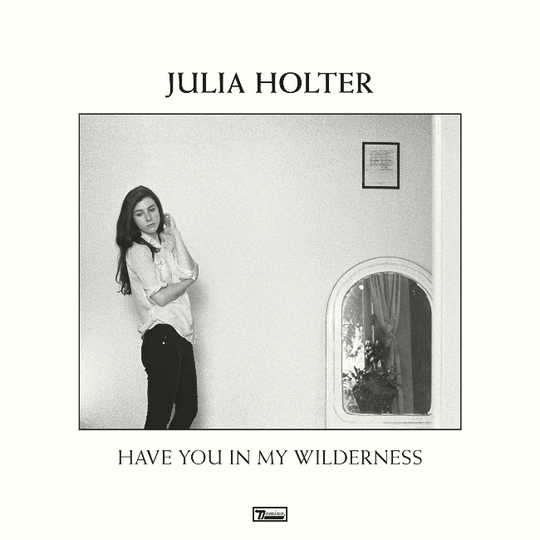Julia Holter Have You in My Wilderness Review

For the pleasing symmetry of its bookending syllables, its general euphony and the raft of images it evokes, 'wilderness' is a wonderful word. A variant meaning, courtesy of the Oxford English Dictionary: 'a piece of ground in a large garden or park, planted with trees, and laid out in an ornamental or fantastic manner, ofttimes in the form of a maze or labyrinth.' I wasn't aware of this usage, simply maybe Julia Holter was when she named her quaternary album. Not necessarily because she intends the wilderness she claims exist interpreted in this sense, but because that definition could so easily apply to her music.
'Ornamental', 'fantastic', 'maze', 'labyrinth'. These words make perfect sense in the context of Holter's songs. Have You in My Wilderness drops the overarching themes which informed her previous three albums in order to accomplish something more intuitive and intimate. The L.A.-based singer has spoken about how this resulted in some tricky recording sessions, telling FACT Mag that 'with previous records where there was a articulate vision information technology was easier.' She goes on to liken 2013's Loud Urban center Song to singing to an audience, while …Wilderness, she states, feels like singing to one person.
Cole Marsden Greif-Neill is again onboard as producer, and past pushing Holter'southward voice way up in the mix the pair not just grace the record the intimacy its songs need, but in some cases a genuine immediacy, too. 'Feel You' is placed at the outset of the LP, its opening flourishes of harpsichord quickly augmented by strings, percussion, a nimble bass-line and a straight-up gorgeous vocal, Holter playing with her cadence to mesmerising outcome. Images tumble thick and fast, of rainy days and empty rooms and figures that blur into one some other in United mexican states Metropolis, while the concept of escape and "running abroad" is introduced in its showtime verse and will figure into the following nine songs. "I'yard blinded by the possibility" Holter declares in the spoken-word passage that closes the song, and that thought, too, is reflected by the lovely, sun-splashed instrumentation it is set against.
'Feel You' and the equally invigorating 'Body of water Calls Me Home' take both been paired with sweet, whimsical videos in social club to preview the album, simply anyone hoping for a full-blown turn into poppier, brighter waters from a vocaliser and then oftentimes prefixed by the term 'advanced' might be disappointed. Not that the two songs are misrepresentative of … Wilderness exactly, simply the sing-song melodies of 'Silhouette' and bouncy lilt of 'Everytime Boots' aside, they are past some measure out its nearly instantly gratifying.
'Lucette Stranded on the Island' and 'Betsy on the Roof' both stretch towards a languorous seven-minute running time. They take longer to sink their claws in, more reminiscent of the freewheeling soundscapes Holter presented on Ekstasis, an album she has noted bears more similarities with this one than the jazzy warmth and unified aims of its immediate predecessor. 'Lucette…' is an impressionistic, dream-like tale set on the bluff of an unnamed Balearic island which again closes with a spoken-discussion segment, Holter reading poetry against the swell of her bankroll musicians. 'Betsy…', meanwhile, has something of the show-tune most it, all strong piano lines that dissolve into a winsome extended coda.
"I awoke pleasing y'all so slowly…I'1000 asking yous to show me how," she sings in the opening verse of 'Night Song', emitting a kind of pleading, uneasy sensuality and working through some very different emotions from those of the preceding 'Sea Calls Me Dwelling'. "What did I do to make you feel so bad?" Holter laments every bit the song turns on its head 2-thirds in; "What did I do that you would make me feel so bad?" The plainspoken language coupled with her wounded tone make it an incredibly affecting few minutes, and hint at the theme of obsession she discusses in the FACT interview.
Holter'due south songs are grand, cinematic experiences, akin to entering a nebulous, shimmering other-world. They are also suffused with details, whether that be an odd sound or an unexpected paradigm. In 'Vasquez', for example, she tells a legend of the Gold Land by zoning in on a few isolated moments, while the production on the closing title runway is beautiful. The vocal wraps up the anthology with the refrain "Tell me, why practise I feel you running away?"
Her style of storytelling is so specific and singular that finding solid narrative threads isn't like shooting fish in a barrel, just instances of fleeing - allusions to running away - exercise pervade these tunes. Simply Holter traverses a huge emotional spectrum on Take You in My Wilderness, and I don't translate these instances equally anything negative, any more than I do the concept of a 'wilderness'. Opportunity comes with any fresh commencement, and that's what it feels like Holter is setting herself up for here. That's the beauty of the record, though: each listener should find their ain things to contemplate, relate to and bask in these thoughtful, ornamental and fantastic songs, and that'south exactly the mode it should exist.
-
8
James Skinner's Score
-
viii
User Score
martinwhichisatur.blogspot.com
Source: http://drownedinsound.com/releases/19025/reviews/4149421
0 Response to "Julia Holter Have You in My Wilderness Review"
Post a Comment